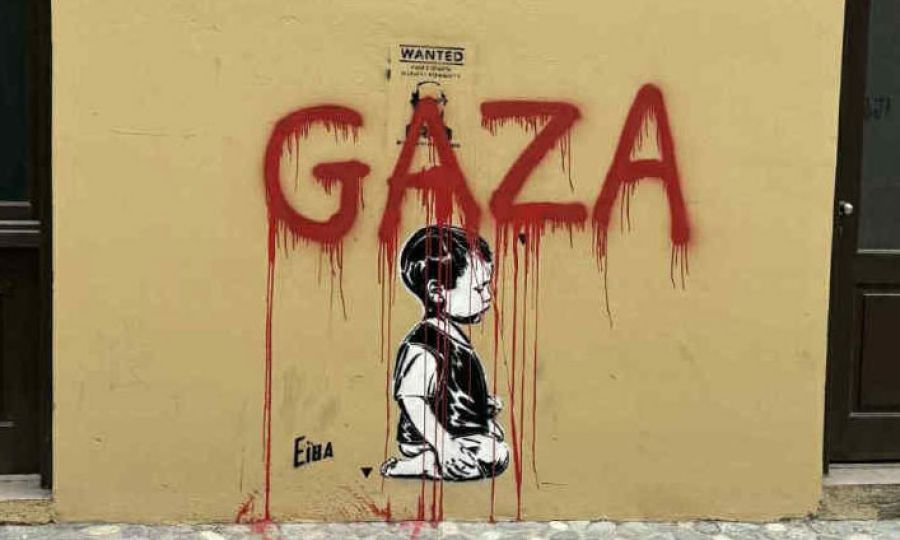
By Andriana Panteli
In light of the publication of the Ministry of Interior’s letter to the Union of Municipalities on “strengthening actions to combat antisemitism and hate speech in Cyprus,” as well as the public debate it sparked, Kathimerini contacted three academics to answer a question that concerns a large segment of citizens: Can the slogan “Free Palestine” be considered antisemitic? Aris Konstantinidis, Associate Professor of International Law and Human Rights Law at the University of Cyprus; Christos Kliridis, Professor of Law at Frederick University; and Nikos Peristianis, Sociologist, attempt to clarify the issue based on international law and conclude that the slogan does not fall under the definition of antisemitism.
The functional definition of antisemitism according to the IHRA
According to the International Holocaust Remembrance Alliance (IHRA), the non-legally binding functional definition of antisemitism, approved by all 31 member states on May 26, 2016, is:
“A certain perception of Jews, which may be expressed as hatred toward Jews. Rhetorical and physical manifestations of antisemitism are directed toward Jews or non-Jews and/or their property, toward Jewish community institutions and religious facilities.”
“The manifestations of antisemitism may include targeting the State of Israel, conceived as a Jewish collectivity. Nevertheless,” the IHRA emphasizes, “criticism of the State of Israel, similar to criticism leveled at any other country, cannot be considered antisemitism.”
The IHRA also provides illustrative examples of antisemitism under this definition, including:
1. Encouraging, condoning, or justifying the murder or injury of Jews in the name of a radical ideology or extremist religious beliefs.
2. Promoting false, dehumanizing, demonizing, or stereotypical claims about Jews as such, or the power of Jews collectively; for instance, but not exclusively, the myth of a global Jewish conspiracy.
3. Holding Jews collectively responsible for real or imagined wrongdoings committed by a single Jew, a group of Jews, or even non-Jews.
4. Denying Jews the right to self-determination, e.g., claiming that the existence of the State of Israel constitutes a racist endeavor.
5. Using symbols or imagery associated with classic antisemitism (e.g., the accusation that Jews killed Jesus, or blood libel) to characterize Israel or Israelis.
6. Comparing contemporary Israeli policies to those of the Nazis.
7. Attributing collective responsibility to Jews for the actions of the State of Israel.
The slogan “Free Palestine” is not antisemitic
All three scholars agree that under no circumstances can the slogan “Free Palestine” be considered antisemitic, as it does not incite violent acts against Jews nor target them as a religious group.

“The State of Israel cannot enjoy immunity if it violates international law”
Konstantinidis notes that under international law, Palestine is considered occupied territory. “The International Court of Justice ruled that Israel is illegally occupying Palestinian territories and that the Palestinian people have a right to self-determination,” he said. Therefore, expressing the slogan Free Palestine in a democratic system is not antisemitic, as it is politically protected under freedom of expression. He further explains that for a slogan to be antisemitic, “it must attribute collective responsibility to Jews for the actions of the State of Israel.” However, according to the IHRA, criticism of Israel, like criticism of any other country, cannot be deemed antisemitism. “The State of Israel cannot enjoy immunity if it violates international law, commits crimes, or perpetrates genocide in Gaza, as recently concluded by the relevant UN committee,” Konstantinidis added.
The slogan is protected by Human Rights Law and International Law
According to Kliridis, the slogan Free Palestine is not antisemitic, confirmed by two principles: (a) freedom of speech and expression, as interpreted by the European Court of Human Rights and Cyprus’s former Supreme Court; (b) the fact that the international community has recognized the Palestinian state, including Gaza.
“Therefore, under both Human Rights Law and International Law, such statements are not considered antisemitic, nor do they violate any principle of hate speech,” Kliridis clarified.
“It appears to be a realistic depiction of what is happening in Gaza”
Peristianis, commenting on a graffiti depicting a kneeling child, said, “It certainly cannot be considered an antisemitic slogan, in the sense that it depicts a child who has been harmed and relates to events in Gaza.” He added, “It seems to be a realistic depiction of what is happening in Gaza.”
Regarding graffiti that included the word “genocide,” Peristianis stated that this too cannot be considered antisemitic. “It is a term many avoided using in the past year due to debate over whether it constitutes genocide. However, following the UN committee’s report, what is happening in Gaza aligns with three of the four criteria of the genocide definition.”
The sociologist added that saying people are being killed in Gaza is not antisemitism. “It is an expression of dissent and resistance to killings carried out by the State of Israel, which the whole world witnesses,” he said.
Which slogans are considered antisemitic
Konstantinidis notes that according to the IHRA, “attributing collective responsibility to Jews for the actions of the State of Israel and equating Jews with Netanyahu’s decisions” constitutes antisemitism. He also points out that denying services to Jews that are available to the general population is considered discriminatory.
Using this logic, Konstantinidis gives as an example an antisemitic slogan: “Jews are unwanted.” “Such a comment should be removed,” he said, adding, “this identification is generally dangerous when we deny the individuality of people we do not know and equate them with government policies that may be unlawful. This is not protected by law; it is an abuse of freedom of speech.”
“Antisemitic graffiti would be graffiti naming Jews and inciting viewers to act against them,” Peristianis explained. He emphasized that if someone tried to exploit animosity toward Israel as a state to incite hatred against Israeli citizens, that would constitute antisemitism.































